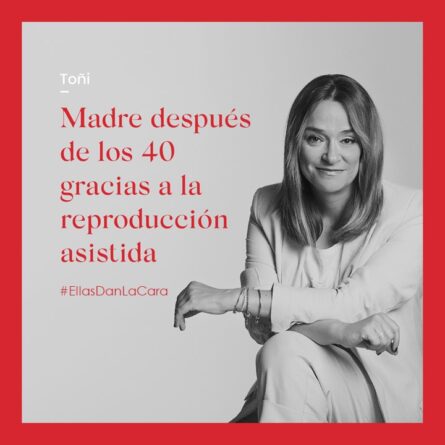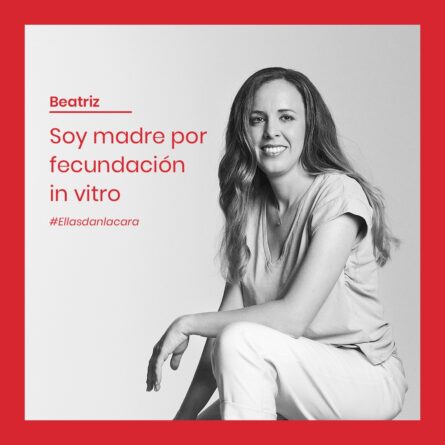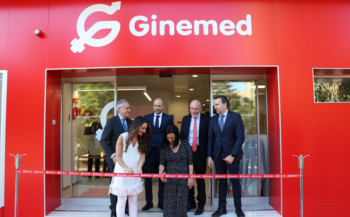- The campaign “Ellas de la cara” aims to normalize reproductive medicine in society, not only for the population with infertility problems; but also for single-parent and same-sex families, as well as to prevent the transmission of genetic diseases to offspring.
- Toñi Moreno, who was a mother after the age of 40 thanks to assisted reproduction, participates in this initiative to make reproduction visible and make women aware of the importance of knowing their fertility to make informed decisions.
- The other protagonists of the campaign are Rhoda, who gestated her daughters with her wife's eggs; Lupe, who at the age of 30 decided to preserve her eggs to become a mother in the future; Beatriz, highly complex case due to implantation failure; and Desi, who managed to get pregnant at Ginemed after 10 years of consecutive repeat abortions at other clinics.

According to data from the National Institute of Statistics (INE), Spain has registered a new historical minimum number of births in the last year (338,532), which translates into a decrease of 0.6% compared to 2020. This fact, as experts explain, may be motivated by the decrease in the number of children per woman, the delay in motherhood, the decrease in pregnancies during confinement or the decrease in the number of women of childbearing age. In addition, the Spanish Fertility Society estimates that 1 in 10 women will need to resort to assisted reproduction techniques in our country since infertility is a problem that affects approximately 15% of the population Spanish.
Despite these data, it is still a taboo. For this reason, Ginemed together with different patient associations has launched the campaign “They show their faces” , with the aim of normalizing reproductive medicine in society and leaving behind its social stigma so that no woman feels alone during reproductive treatments.
Through the voice of patients, the campaign will spread tips for caring for fertility over the next few months on different channels, give visibility to family models and offer information on the prevention of transmission of genetic diseases through reproductive techniques assisted.
Under the hashtag #EllasDanLaCara, the National Infertile Network Association, the Association of Single Mothers by Choice, the DeFrente Association, the State Association of Women Affected by Endometriosis (ADAEC), the Association Women Affected by Endometriosis of Huelva (Endohuelva), the Association of Women Sick of Endometriosis (Endoeuskadi), the Association of Endometriosis Affected Women of Valencia (AAEV), the Andalusian Association of Hemophilia (ASANHEMO) and the Union of Sick and Family Members of Huntington , thus demonstrating its commitment to standardizing the use of reproductive medicine.
Helena Fernández, the president of Red Infertiles, the national association of infertility patients, highlights “the importance of women with infertility not feeling alone or misunderstood. With actions like this, we encourage those who suffer from a reproductive problem to take the step to seek help and support, so that they can find solutions to infertility.” For its part, from ADAEC, committed to raising social awareness, they affirm that “there is a general lack of knowledge of women's health. Endometriosis and infertility often go hand in hand, unfortunately. Thanks to these campaigns we contribute to making society more aware”.
The Association of Single Mothers by Choice, which has also joined the campaign, values "motherhood chosen alone as a growing family model. Our association has been fighting for 15 years to advance its normalization, although there is still a lot to do .". Finally, from Asanhemo they expose: "We value assisted reproduction techniques for couples with problems of offspring due to the possible transmission of genetic diseases".
From Ginemed, Dr. Pascual Sánchez, co-founder and medical director of the company, assures that “it is essential that reproductive medicine be normalized and stop being a taboo. Our commitment to the patient also involves working against this reality. Since our beginnings we have worked to educate and inform society, and it is that as doctors we have the responsibility that data as evident as that between the ages of 25 and 35 female fertility drops to 50% reaches the population”.
Toñi Moreno gives a voice to mothers who decide to start a family alone
The journalist and presenter Toñi Moreno, a mother thanks to reproductive medicine at Ginemed, is also part of the campaign "Ellas da la cara", with which she seeks to contribute to continue normalizing single-parent families. “In my path I have met many brave women who have embarked on single motherhood because they wanted to be mothers and they wanted to start their own family. The typical family model is not needed. Many people stop me on the street and ask me about my process and I have no problem sharing it because I think that's how I help them," he says.
As he explains, “knowing if you are fertile and until what year you are fertile is essential to make decisions. I unfortunately did not freeze my eggs. If someone had informed me when I was 30 years old, I would have preserved it and would not have had to resort to egg donation to have my daughter.”

Rhoda, Desi and Bea, mothers thanks to reproductive medicine
Rhoda, gestated her daughters with her wife's eggs and shares her experience: “We chose the ROPA method because it was the only option available to be able to participate in the two actively in assisted reproduction treatment”. And he recognizes that, although reproductive medicine is more normalized among homoparental female couples "because it is the only option we have to be mothers", the ROPA method is still a little-known technique.
“It is a problem of disinformation, mainly. Sometimes the most unfortunate comments come to you from your closest circle, from the people who love you. The social imaginary is full of myths and prejudices that spread like wildfire”, explains Desiré, who has participated in the campaign, and who managed to become a mother in Ginemed after 10 years trying in other clinics. "We think that it is time for this reality to be known and perhaps we had to start with ourselves, facing up and giving voice to infertility," she adds.
And it is that the lack of information that people have about reproductive treatments, together with the physical and emotional wear and tear that they can sometimes entail, leads patients to feel misunderstood and, on many occasions, judged. “We are not weird people, we are normal people. More and more women and men have to resort to assisted reproduction treatments to become parents”, explains Desiré.

For her part, Beatriz shares her story: a highly complex case due to implantation failure. She tells us how she felt when the pregnancy did not come naturally: “The information that comes to you is always from a woman of a certain age who does not get pregnant because her rice has passed, and I really started looking when I was 29 years old. ”. Faced with the desperation of thinking that she could no longer be a mother after several attempts at in vitro fertilization, she arrived at the Ginemed High Complexity Case Unit. "That's when you realize that yes, there are many more options, that there are tests that you can do, treatments that are the best in assisted reproduction, and that most people don't know about."
Preserving fertility to plan maternity
One of the key facts of this campaign is that female fertility drops to 50% between the ages of 25 and 35, at which point being a mother with one's own eggs becomes a difficult task . For this reason, specialists recommend not delaying motherhood beyond the age of 35 and requesting a basic fertility study at gynecological examinations, which can be obtained with a simple ultrasound and hormonal analysis.
With this information, the woman can decide if she wants to have children. If not, there is the option of preserving your fertility by freezing your eggs, so that when the time comes to become a mother, time has not affected your gametes.
"My gynecologist in a normal review suggested that I know my ovarian reserve," says Lupe, who froze her eggs. "I decided to preserve it because obviously at 30 years old today it is not normal to be a mother and in the future I did want to be." In addition, she adds that “what surprises me the most is that women are not informed, we believe that with an annual gynecological check-up and having our monthly period everything is fine, and it is not like that”.
In this sense, the importance of taking care of fertility is also one of the main themes of the international campaigns launched by other clinics of the group to which Ginemed belongs, GeneraLife. Such is the case of the #FertyCheck campaign, launched in Italy, to promote the preservation of motherhood among younger women.
Endometriosis, PCOS and fertility
Another fact that Ginemed highlights is that 30% to 50% of those affected by endometriosis will have infertility problems, a disease that affects between 5 and 10% of women, and this percentage may be more high due to lack of diagnosis.
For its part, Polycystic Ovarian Syndrome (PCOS) is the most common endocrinological disorder in women of childbearing age (between 4-10%). It has a high relationship with fertility because it is frequently associated with menstrual irregularities, and can even lead to anovulation. In addition, women with PCOS are at increased risk of miscarriage in the first trimester.
Reproductive Medicine and Genetic Diseases
Another widely held belief is that reproductive medicine is only related to infertility. However, it is not so. In addition to heteroparental couples who want to be parents and are unable to do so by natural means, and homoparental and single parent couples who would not be able to have children were it not for reproductive techniques, we cannot forget the prevention of the transmission of genetic diseases from parents to children, which today is possible thanks to advanced Assisted Reproduction techniques.




No hay comentarios